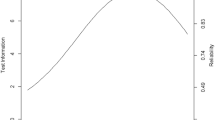Abstract
The Fear of Missing Out (FoMO) is the sense that others are having a rewarding experience which one is absent from. Given that it is associated with the drive to remain socially connected, research has predominantly focused on the link between FoMO and social networking use. While a 10-item measure of FoMO is widely used (FoMOs), a shorter scale may be preferable in some circumstances and would allow FoMO to be measured in more diverse contexts. Therefore, we aimed to validate a FoMO short-form (consisting of a single item: “Do you experience FoMO?”). In Studies 1 to 3, we measured the concurrent validity of the FoMOsf with the 10-item FoMOs (Pearson’s R correlation between the FoMOs and FoMOsf: Study 1 r = .735, r = .654; Study 2 r = .638; Study 3 r = .807). In Study 2, we measured the test-retest reliability of the FoMOsf (r = .717). In Study 2 and 3, we measured the construct validity of the FoMOsf by linking the FoMOsf to social networking use. The FoMOsf showed good concurrent validity, construct validity, and test-retest reliability and is adequate for use in research.
Similar content being viewed by others
References
Abel, J. P., Buff, C. L., & Burr, S. A. (2016). Social media and the fear of missing out: Scale development and assessment. Journal of Business & Economics Research, 14(1), 33.
Adams, S. K., Williford, D. N., Vaccaro, A., Kisler, T. S., Francis, A., & Newman, B. (2016). The young and the restless: Socializing trumps sleep, fear of missing out, and technological distractions in first-year college students. International Journal of Adolescence and Youth, 22(3), 337–348. https://doi.org/10.1080/02673843.2016.1181557.
Alt, D. (2016). Students’ wellbeing, fear of missing out, and social media engagement for leisure in higher education learning environments. Current Psychology. https://doi.org/10.1007/s12144-016-9496-1.
Baker, Z. G., Krieger, H., & LeRoy, A. S. (2016). Fear of missing out: Relationships with depression, mindfulness, and physical symptoms. Translational Issues in Psychological Science, 2(3), 275. https://doi.org/10.1037/tps0000075.
Beyens, I., Frison, E., & Eggermont, S. (2016). “I don’t want to miss a thing”: Adolescents’ fear of missing out and its relationship to adolescents’ social needs, Facebook use, and Facebook related stress. Computers in Human Behavior, 64, 1–8. https://doi.org/10.1016/j.chb.2016.05.083.
Blackwell, D., Leaman, C., Tramposch, R., Osborne, C., & Liss, M. (2017). Extraversion, neuroticism, attachment style and fear of missing out as predictors of social media use and addiction. Personality and Individual Differences, 116, 69–72. https://doi.org/10.1016/j.paid.2017.04.039.
Buglass, S. L., Binder, J. F., Betts, L. R., & Underwood, J. D. (2017). Motivators of online vulnerability: The impact of social network site use and FOMO. Computers in Human Behavior, 66, 248–255. https://doi.org/10.1016/j.chb.2016.09.055.
Elhai, J. D., Levine, J. C., Dvorak, R. D., & Hall, B. J. (2016). Fear of missing out, need for touch, anxiety and depression are related to problematic smartphone use. Computers in Human Behavior, 63, 509–516. https://doi.org/10.1016/j.chb.2016.05.079.
Konrath, S., Meier, B. P., & Bushman, B. J. (2014). Development and validation of the single item narcissism scale (SINS). PLoS One, 9(8), e103469. https://doi.org/10.1371/journal.pone.0103469.
Kuss, D. J., & Griffiths, M. D. (2017). Social networking sites and addiction: Ten lessons learned. International Journal of Environmental Research and Public Health, 14(3), 311. https://doi.org/10.3390/ijerph14030311.
Lamblin, M., Murawski, C., Whittle, S., & Fornito, A. (2017). Social connectedness, mental health and the adolescent brain. Neuroscience & Biobehavioral Reviews, 80, 57–68. https://doi.org/10.1016/j.neubiorev.2017.05.010.
Nichols, A. L., & Webster, G. D. (2013). The single-item need to belong scale. Personality and Individual Differences, 55(2), 189–192. https://doi.org/10.1016/j.paid.2013.02.018.
Nichols, A. L., & Webster, G. D. (2014). The single-item need for consistency scale. Individual Differences Research, 12(2), 50–58.
Oberst, U., Wegmann, E., Stodt, B., Brand, M., & Chamarro, A. (2017). Negative consequences from heavy social networking in adolescents: The mediating role of fear of missing out. Journal of Adolescence, 55, 51–60. https://doi.org/10.1016/j.adolescence.2016.12.008.
Przybylski, A. K., Murayama, K., DeHaan, C. R., & Gladwell, V. (2013). Motivational, emotional, and behavioral correlates of fear of missing out. Computers in Human Behavior, 29(4), 1841–1848. https://doi.org/10.1016/j.chb.2013.02.014.
Riordan, B. C., Flett, J. A. M., Hunter, J. A., Scarf, D., & Conner, T. S. (2015). Fear of missing out (FoMO): the relationship between FoMO, alcohol use, and alcohol-related consequences in college students. Annals of Neuroscience and Psychology, 2, Article 7.
Robins, R. W., Hendin, H. M., & Trzesniewski, K. H. (2001). Measuring global self-esteem: Construct validation of a single-item measure and the Rosenberg self-esteem scale. Personality and Social Psychology Bulletin, 27(2), 151–161. https://doi.org/10.1177/0146167201272002.
Watson, D., Clark, L. A., & Tellegen, A. (1988). Development and validation of brief measures of positive and negative affect: The PANAS scales. Journal of Personality and Social Psychology, 54(6), 1063–1070.
Widaman, K. F., Little, T. D., Preacher, K. J., & Sawalani, G. M. (2011). On creating and using short forms of scales in secondary research. In K. H. Trzesniewski, M. B. Donnellan, & R. E. Lucas (Eds.), Secondary data analysis: An introduction for psychologists (pp. 39–61). Washington, DC: American Psychological Association.
Woods, S. A., & Hampson, S. E. (2005). Measuring the big five with single items using a bipolar response scale. European Journal of Personality, 19(5), 373–390. https://doi.org/10.1002/per.542.
Acknowledgements
This research was funded by the Health Research Council of New Zealand (Grant Number: 17/568) and University of Otago Research Grant, both awarded to Damian Scarf. Benjamin Riordan was sponsored by a Fulbright New Zealand General Graduate Award.
Author information
Authors and Affiliations
Corresponding authors
Ethics declarations
Conflict of Interest
On behalf of all authors, the corresponding author states that there is no conflict of interest.
Ethical Approval
All procedures performed in studies involving human participants were in accordance with the ethical standards of the institutional and/or national research committee and with the 1964 Helsinki declaration and its later amendments or comparable ethical standards.
Rights and permissions
About this article
Cite this article
Riordan, B.C., Cody, L., Flett, J.A.M. et al. The development of a single item FoMO (Fear of Missing Out) scale. Curr Psychol 39, 1215–1220 (2020). https://doi.org/10.1007/s12144-018-9824-8
Published:
Issue Date:
DOI: https://doi.org/10.1007/s12144-018-9824-8




